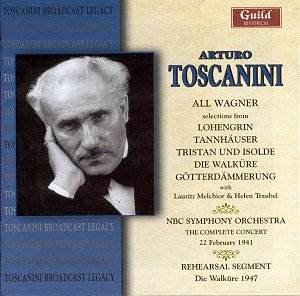This
is a fascinating product, with excellent and informed accompanying
notes by William Youngren, who refers conscientiously to other
extant recorded alternatives left by the maestro (he also almost
provides a review of the present performances). Even broadcast
commentaries are kept to a minimum, and the first disc starts
straight into a tender account of the Lohengrin Act 1 Prelude.
Here is an example of Toscanini the structuralist, keeping the
orchestra within piano for an extended period with miraculous
control and conveying a compelling religiosity, working hypnotically
towards the climax (which does, admittedly, threaten to distort).
This Prelude will always challenge an orchestra, especially at
the very opening of a concert, and the NBC strings acquit themselves
luminously.
Helen
Traubel joins the NBC forces for ‘Dich, teure Halle’ from Tannhäuser.
Robert Farr, in his review of this product (http://www.musicweb-international.com/classrev/2003/July03/Wagner_Toscanini1941.htm),
provides excellent background for this singer. Suffice it for
me to say that one is left in no doubt of Traubel’s resolve, nor
of the orchestra’s excellence (the Toscaninian drilling of the
strings obviously paying rich dividends). This excerpt functions
as an excellent entrée to the meat course of the first
disc, Act 1 Scene 3 of Walküre, a near half-hour segment
(the late-comers referred to in the broadcast commentary should
feel appropriately shamed, for they missed a treat!).
Traubel
is joined by the 50 year old Lauritz Melchior for the final 26
minutes of Walküre Act 1 (beginning the orchestral
passage preceding ‘Ein Schwert verhiess mir der Vater’). Melchior
is wonderfully strong throughout his register, completely immersed
in his role as hero; Traubel is consistently gripping. As with
Melchior, her voice encompasses the wide range Wagner asks for
with ease and has all of the requisite strength (try her entry
at ‘Du bist der Lenz’, or her naming of her companion as ‘Siegmund’).
But it is Toscanini who provides the thread that binds it all
together, dragging the listener in.
Which
is not to say he does not get carried away in the heat of the
moment. Melchior does not (or is not allowed to) dwell on the
first cry of ‘Wälse’ and as the music hurtles onwards, words
can count for very little (blink and you miss Traubel’s ‘So bist
du ein Wälsung’). A similar situation arises at Melchior’s
cry of ‘zu mir’ immediately preceding the sword-extraction. A
pity also that Traubel seems closer to the microphone than Melchior
at the end (‘Braut und Schwester’ emerges distanced and muffled).
The
Tristan Prelude is imbued with a seemingly unstoppable
momentum as it moves inexorably towards its climax. Its ending
might initially strike the listener as puzzling: Toscanini uses
the perfunctory 1859 concert ending rather than having the two
pizzicato cello and bass notes lead into the Verklärung.
This leaves a curiously incomplete, insubstantial feel, especially
as in the present Guild issue this piece closes the first disc.
The
second disc consists primarily of Götterdämmerung
excerpts. Concentration is the keyword here, which coupled with
Toscanini’s interpretative security makes for a winning combination.
A powerful force runs through the Funeral March and the orchestra
seems positively alight in the Immolation. Traubel seems less
internally illuminated, however. She seems to be saving herself
for the high notes, and her ‘Edra impression’ (‘Alles weiss ich’)
is superficial and unconvincing.
The
1947 rehearsal sequence is an interesting addendum. Toscanini,
alone with his orchestra, is intense and passionate. It is worth
hearing the first excerpt just to hear him croak and groan his
way through the missing vocal lines. Not to mention his echt-Italinate
pronunciation of ‘Rehearsal Number 6’, with ‘number’ emerging
as the result of some ‘Google’ search decades before its time
(‘Noooooooooooomber 6’, he says).
The
second excerpt contains one of his famous outbursts (read ‘tantrums’):
‘Why don’t you play before? Tell me why! I am not stupid …’. Does
anyone dare to talk to an orchestra like this these days, I wonder?.
Rewarding
listening, then. This is a valuable document, well worth acquiring.
Colin
Clarke
see also review by Robert
Farr
